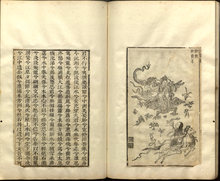Xiang River goddesses
| Xiangshuishen | |||||||

"Xiang River Goddesses" (Xiang Jun), poem number 3 of 11 in the Nine Songs section, in an annotated version of Chu Ci, published under title Li Sao, attributed to Qu Yuan and illustrated by Xiao Yuncong.
|
|||||||
| Chinese | |||||||
|---|---|---|---|---|---|---|---|
| Literal meaning | Xiang River Goddesses | ||||||
|
|||||||
| Transcriptions | |
|---|---|
| Standard Mandarin | |
| Hanyu Pinyin | Xiāngshuǐshén |
The Xiangshuishen or Xiang River Goddesses are goddesses (or spirits, and sometimes gods) of the Xiang River in Chinese folk religion. The Xiang flowed into Dongting Lake through the ancient kingdom of Chu, whose songs in their worship have been recorded in a work attributed to Qu Yuan. According to a somewhat later tradition, the Xiang goddesses were daughters of the Emperor Yao, who were named Ehuang (Chinese: 娥皇; pinyin: É Huáng; Fairy Radiance) and Nüying (Chinese: 女英; pinyin: Nǚ Yīng; Maiden Bloom) who were said to have been married by him to his chosen successor, and eventually emperor, Shun, as a sort of test of his administrative abilities: then, later, they became goddesses, after the death of their husband.
The spots that appear on the stems of certain bamboos legendarily first appeared on the bamboo growing by the Xiang River, caused by the tears which fell upon them, shed by the two Xiang River goddesses, mourning the disappearance and presumed death of their beloved husband, the Emperor and hero Shun. There are various versions of this mythological story; but, according to one version, in the last year of his reign Shun decided to tour the country of the Xiang River area. According to another version he was engaged in a military expedition versus the "Miao". Upon his sudden death during this journey, in the "Wilderness of Cangwu", near the headwaters of the Xiang River in the Jiuyi Mountains (sometimes translated as Doubting Mountain), both of his wives rushed from home to his body (or, in another version, to look for it, but were unable to find it), and then they wept by the river for days: their copious tears falling upon the bamboos by the river, stained them permanently with their spots.
...
Wikipedia
